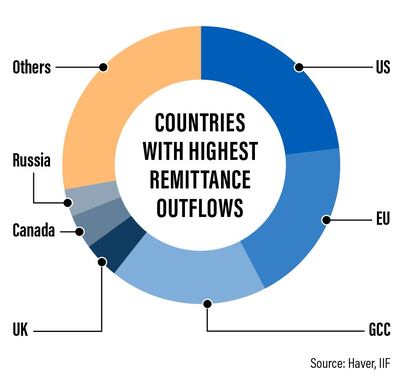Global remittances may fall as much as 30 per cent this year as the coronavirus-induced recession affects countries worldwide, particularly those that account for the bulk of outflows to emerging markets, the Institute of International Finance said.
“As the Covid-19 recession affects more countries simultaneously, especially host countries in the EM [emerging markets] universe, a drop of 20-30 per cent seems possible,” the IIF said in its latest research published on Wednesday.
The forecast echoes that of the World Bank, which said in April it expects remittances to low and middle-income countries to fall by about 20 per cent in 2020, with only a moderate recovery in 2021.
By comparison, in 2009 following the global financial crisis remittances fell by about 5 per cent.
The Covid-19 outbreak is the biggest challenge facing the world economy since the 1930s, according to the International Monetary Fund, which expects global GDP to contract by 3 per cent this year.
The spread of the virus over the last few months has rattled investors and stifled flows to emerging markets.
Capital flows to emerging markets securities fell 78 per cent in May despite efforts to reopen economies in Asia and North America, the IIF said in its latest Capital Flows Tracker report also published this week.
Remittances are another vital source of external flows to emerging and frontier markets, the IIF said in the remittances research note.
While remittances are more stable than portfolio flows and tend to be countercyclical, they will “likely be much lower due to the global and synchronised nature of shocks”, the IIF said.
Economies that account for the bulk of global remittance flows are among the most exposed to the Covid-19 and oil price shocks, the IIF said.
The US accounts for most of the flows to Latin America, Europe is an importance source for remittances for Africa and Eastern Europe, and GCC-based workers send money to home countries in Africa and Asia.
Emerging markets, including key recipient countries India, China, Mexico, the Philippines, Egypt and Nigeria, account for close to 40 per cent of all remittances in dollar terms.
Countries with high external funding pressures, including those in Central America, Caribbean nations, the Philippines and Egypt, will be among the most exposed, the IIF said.
Data for January to April already show a sharp decline in remittances to many Latin American and Caribbean countries as well as Bangladesh, Kenya and Sri Lanka – in some cases by as much as 40 per cent year-on-year, the research note said.
Remittances depend on migration, host and home-country growth, exchange rate fluctuations and the ability to transfer money across borders.
In host countries, Covid-19 shutdowns have disproportionately affected sectors where migrants are more likely to be employed, such as food and hospitality, retail and wholesale trade, tourism and transportation, the IIF said.
The crisis has curtailed migrants’ ability to shift across sectors or gain access to government support. The “unbanked” population, which often does not have access to electronic remittance transfers, also faces challenges to send money home.



